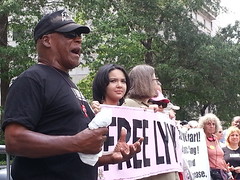 When U.S. District Judge John Koetl sentenced radical attorney Lynne Stewart to 10 years in prison in 2009, he said he was not giving her a “death sentence,” even though she had been diagnosed with cancer in 2005 and her imprisonment would delay a planned surgery for 18 months. But, outrageously, Lynne is being left to die confined in a federal prison near Fort Worth, Texas, as cancer spreads through her body. (For background on her case, see “Free Lynne Stewart NOW!” online at revcom.us).
When U.S. District Judge John Koetl sentenced radical attorney Lynne Stewart to 10 years in prison in 2009, he said he was not giving her a “death sentence,” even though she had been diagnosed with cancer in 2005 and her imprisonment would delay a planned surgery for 18 months. But, outrageously, Lynne is being left to die confined in a federal prison near Fort Worth, Texas, as cancer spreads through her body. (For background on her case, see “Free Lynne Stewart NOW!” online at revcom.us).
Supporters around the world, led by her husband Ralph Poynter and many of the political prisoners she defended in 40 years as a “people’s lawyer,” are fighting the vindictive, deadly action of the system to keep her in prison, demanding that she be released immediately to return to New York City.
A petition at change.org demanding her release has almost 25,000 signatures, and led, initially, to the Bureau of Prisons indicating they might endorse the prison warden’s request that Lynne be released for treatment. Arrangements had been made to transfer her for treatment to a New York City hospital when, on June 24, the Federal Bureau of Prisons suddenly denied her emergency petition on the grounds that while she is seriously ill, they did not expect her to die in the next 18 months.
Lynnestewart.org reports that her “condition is deteriorating rapidly. Medical treatment to arrest the cancer that is metastasizing in her body has been halted because she is too weak to receive it. She remains in isolation, as her white blood cell count is so low that she is at risk for generalized infection.” Her daughter, a physician, said, “Under the best circumstances, Lynne would be in a battle of the most serious consequences with dangerous odds. With cancer and cancer treatment, the complications can be as debilitating and as dangerous as the cancer itself.”
Lynne’s attorneys, Jill Shetlow and Robert Boyle, have gone back to the Bureau of Prisons with the latest medical opinion that her health has worsened in the last month, and also filed an emergency motion with Judge Koetl. On July 31, 75 supporters packed his courtroom. Shetlow wrote to Koetl that “Ms. Stewart is dying. Her condition is rapidly deteriorating,” and asked him to expedite her release on grounds of compassion, so that she could return to spend her last months with her family. They argue that Koetl has the authority to order her immediate release.
Koetl—who originally sentenced Lynne Stewart to 28 months in prison, and revised the sentence upward when the Bush regime demanded it—asked why the attorneys were using their only chance for an emergency appeal now. They replied that she is terminally ill and does not wish to die in prison. He set a hearing for August 8 for oral argument, noting that he thought prisoners should have the right to see their medical records. He directed the government to explain why the Federal Bureau of Prisons was not providing access to the medical records on which its June 24 decision was made.
In the continuing government quest for revenge against Lynne, the U.S. Assistant District Attorney on the case said that he doesn’t believe Koetl has jurisdiction on the matter, which should only be a Bureau of Prisons decision, and objected that there is no “formal appeal” for him to rule on. Meanwhile, in the prison, as the revcom.us article pointed out, “Stewart, who is hardly a flight risk, must wear 10 pounds of shackles on her wrists and ankles with connecting chains whenever she makes the trip to the prison physician. And in the prison hospital she is shackled wrist and ankle to the bed.”
Lynne’s motion to the judge pointed to systemic disregard of dying prisoners’ rights. “The Bureau of Prisons has implemented its own interpretation and refused to notify the sentencing judge of objectively ‘extraordinary and compelling circumstances,’ including but not limited to imminent death, unless, in its own judgment, a motion should be granted. Between 2000 and 2008, on average, 21.3 motions were filed each year. In about 24% of those motions, the prisoner died before the district court ever had a chance to rule on the motion.”
Last month, Lynne said that she was “disappointed but not devastated” by the Bureau of Prison’s “barbaric decision” not to release her. She is using her limited energy and 10 phone minutes per day to keep people’s attention on the whole system. “When I compare myself to other far worse off than I am—the Guantánamo and Pelican Bay prisoners, Marie Mason, Afia Siddiqui, Hugo Yogi Pinell, those under death Penalty like Kevin Cooper, the remaining Angola 2, Ruchell Magee and my fellow New Yorkers Jalil, Sekou, Herman, Seth, David, Abdul—let me stop before I choke up here… I know we MUST win my fight and the struggle for all other political prisoners to be freed. And then we must struggle for all to be free in this country.”
On August 1, Lynne Stewart’s supporters rallied in protest in New York City and San Francisco. A protest demanding her immediate release is set for Monday, August 12 at the White House (more information at www.lynnestewart.org).
Debra Sweet is the director of World Can’t Wait, and blogs at debra.worldcantwait.net.
